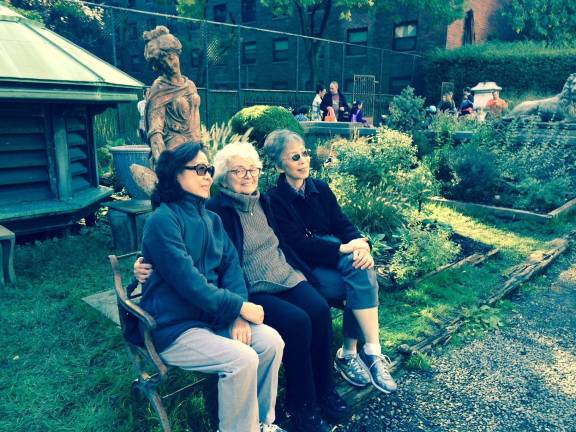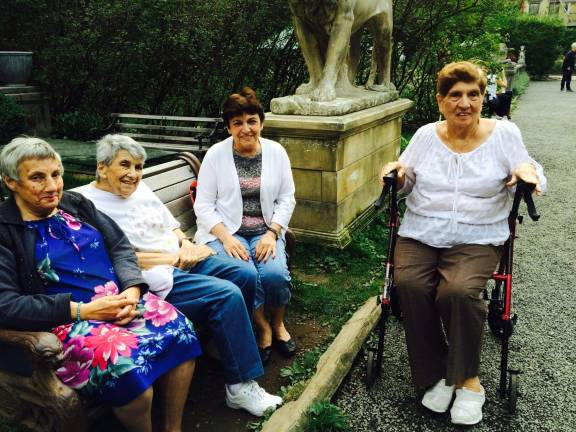the battle over elizabeth street garden


by natasha roy
The tension in the room was palpable during a June 25 community meeting concerning the future of Elizabeth Street Garden.
In December, the city announced its plans to raze the nearly one-acre stretch of a sculpture garden in Nolita to make room for low-income housing geared toward LGBTQ seniors. The future development, called Haven Green, will also house Habitat for Humanity New York City and SAGE, according to a press release from the city.
“In addition to continuing to serve low- and moderate-income New Yorkers across the city, Habitat NYC will provide credit counseling and education services to residents and community members, as well as manage the ongoing maintenance and programming for the open public space,” the press release said. “A portion of the Habitat NYC space will serve as a flexible workspace for community activities.”
Haven Green would house 123 low-income senior citizens. However, the Friends of Elizabeth Street Garden are fighting to save their green space. At the community board meeting, the group’s president, Jeannine Kiely, spoke about saving the garden, and she later told Our Town that it would be preserving an essential community space.
“What I love about the garden is it’s one of the few public spaces that brings people together from all different ages and walks of life, and it’s sort of a melting pot,” Kiely said. “You don’t really get that anywhere else in this neighborhood ... I’ve met so many different people who live in the community, and it really becomes sort of a informal community center.”
While most people at the meeting hoped to save the garden, many citizens and nonprofits advocated for the low-income housing. Several of those in favor of the development accused the garden’s supporters of not caring about senior and homeless New Yorkers who need affordable housing. The Friends countered this sentiment, saying the group had proposed an alternate site for the development at 388 Hudson St.
The Friends said that by building at 388 Hudson St., the city could create five times as much housing for low-income seniors. But Cooper Square Committee Executive Director Steve Herrick said he doesn’t believe the number of apartments that could be built at the alternate site can feasibly be that high, and that more research needs to be done on the site.
“I’m thinking you can build maybe 150 to 200 apartments, assuming there aren’t major impediments to building there,” Herrick said.
The Cooper Square Committee works with many seniors in need of affordable housing, and Herrick said the board of directors is in support of the development. Herrick had attended the community meeting, and he said he understood that residents want to preserve the garden, but he also believes some don’t want to see a changing demographic in the area.
“There’s a crisis,” Herrick said. “There’s 1.2 million seniors in New York City, and the population’s gonna go to 1.6 million in 20 years. Where are they gonna live? They’re aging in place in tenement buildings, including in Little Italy. They need housing. That’s the reality.”
At the meeting, several families and seniors voiced their desire to save the garden because of its position as a community center, but business owners in the area, like Lovely Day’s Kasuza Jibiki, are also concerned that with the departure of the garden comes the departure of customers. Jibiki said many people who eat lunch at the garden during the day will come into her restaurant to pick up food.
“I think lots of businesses actually chose this block because of the garden,” Jibiki said.
Several low-income residents themselves feel strongly about the garden’s potential erasure. Jennifer Romine lives in affordable housing on Spring Street, and she said that while there’s been a misrepresentation that only rich, selfish people want to save the garden, low-income New Yorkers in the area need the park space.
“It’s one of the most congested, heavily trafficked neighborhoods in the five boroughs,” Romine said. “I’ve seen the health of the community transformed in a myriad of wonderful ways since this garden has become open to the public.”
Romine said several seniors in her building are concerned because they physically can’t walk to parks, like Washington Square Park, that are farther from their homes. Families with children in her building have also expressed sadness over the idea of the garden disappearing.
“These people really, they can’t afford fancy after-school programs and lessons and things,” Romine said. “They need a park. They need a park to go on the weekends.”